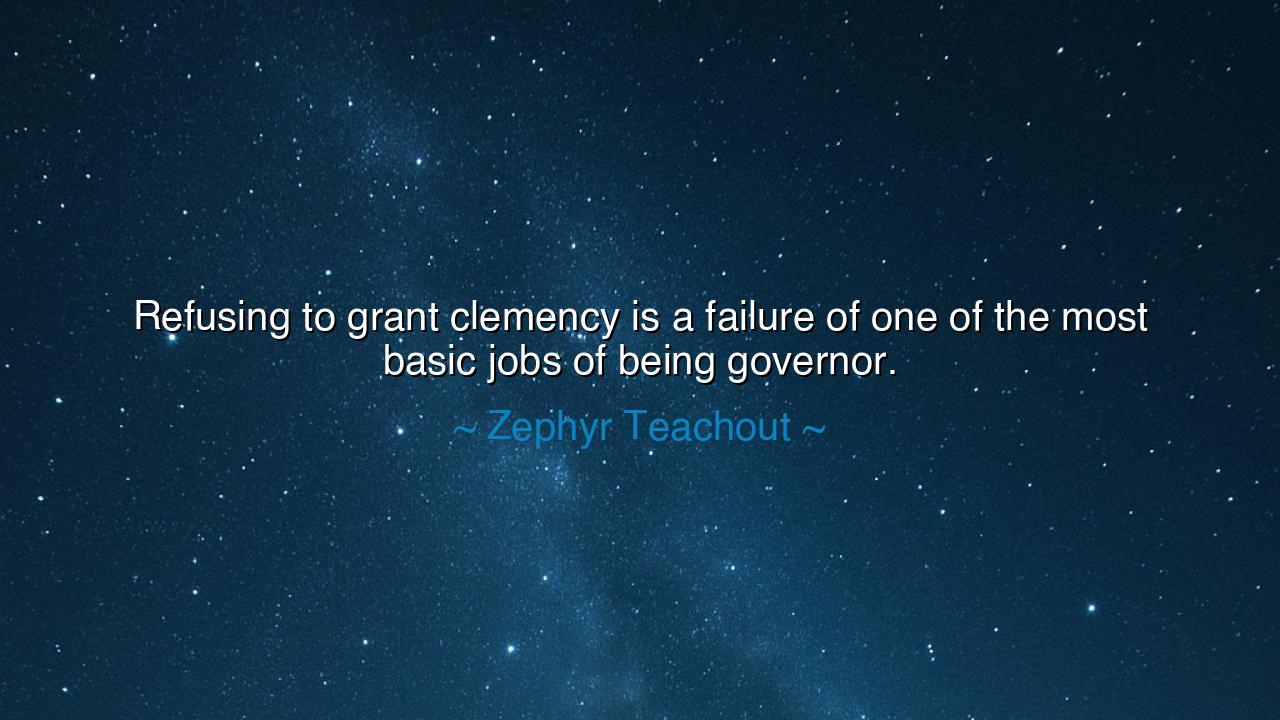
Refusing to grant clemency is a failure of one of the most basic
Refusing to grant clemency is a failure of one of the most basic jobs of being governor.






Opening Scene
The room is quiet, filled with the soft hum of the evening. Jack and Jeeny sit together at the kitchen table, mugs of tea resting gently between them. The fading light of the day casts soft shadows across the room, while the warmth from the lamp adds a comforting glow. The conversation has shifted, and the weight of the topic seems to fill the space between them.
Host: The stillness in the room is almost deliberate, as if the words about to be shared carry a deeper meaning. Jeeny takes a deep breath, her expression thoughtful, before she brings up the quote that has been on her mind.
Jeeny: (gently, her voice reflective) “I was reading something by Zephyr Teachout that really made me think. She said, ‘Refusing to grant clemency is a failure of one of the most basic jobs of being governor.’ Isn’t that a powerful statement? It’s such a direct way of thinking about the role of leadership and compassion.”
Jack: (nodding slowly, his voice calm) “It really is. Clemency isn’t just a political decision — it’s a moral one. And Teachout’s words remind us that at its core, being a leader, especially a governor, isn’t just about enforcing the law. It’s about recognizing when to show mercy and make a decision that reflects the humanity of the situation.”
Jeeny: (smiling softly, her voice gentle) “Exactly. It’s easy to get caught up in the mechanics of law and order, to think of leadership as just following rules and making decisions based on what’s ‘right’ or ‘fair.’ But clemency is about the bigger picture, about seeing beyond the black-and-white aspects of a case and considering the human side — the person who made a mistake and the potential for growth and redemption.”
Host: The quiet in the room deepens, as though Teachout’s words have unlocked a deeper understanding between them. The gentle flicker of the lamp creates a rhythm to their conversation, while Jack reflects on the balance between justice and mercy in leadership. Jeeny watches him, sensing the weight of their discussion.
Jack: (softly, his voice contemplative) “It makes me think about how leadership is often about striking that balance between order and compassion. A governor, or any leader, has to be able to weigh the law with empathy, understanding that not every situation can be solved with a strict, one-size-fits-all approach. Sometimes, the right thing to do isn’t the easiest or the most obvious — it’s the one that considers the human aspect of the decision.”
Jeeny: (nodding, her voice reassuring) “Yes, exactly. And the ability to grant clemency is part of showing that we’re more than just the sum of our laws. It’s a reminder that we have to treat people as individuals, not just cases or numbers. It’s about recognizing that redemption and growth are possible, and that sometimes mercy can be more transformative than punishment.”
Host: The warmth in the room feels deeper now, as though the conversation has reached a place of quiet understanding. The world outside continues, but inside, Jack and Jeeny sit in the realization that leadership isn’t just about maintaining control or sticking rigidly to the rules. It’s about recognizing the need for mercy and compassion, understanding that justice isn’t always about punishment — it’s about healing, growth, and second chances.
Jack: (with a small, reflective smile, his voice calmer) “I think Teachout’s point is powerful. If a leader can’t recognize when clemency is needed, when mercy should be shown, then they’re failing at one of the most fundamental parts of their role — to lead with both strength and empathy.”
Jeeny: (smiling softly, her voice affirming) “Exactly. Leadership isn’t just about making tough decisions — it’s about knowing when to show mercy, when to offer second chances. And that’s what makes a leader truly great: their ability to balance justice with compassion.”
Host: The evening stretches on, but the room feels fuller now, filled with the quiet realization that leadership is not just about enforcing the law, but about understanding the human experience and knowing when to show mercy. Jack and Jeeny sit together, understanding that clemency isn’t just a political choice — it’s a reflection of the values of leadership, empathy, and compassion that define a truly effective leader.






AAdministratorAdministrator
Welcome, honored guests. Please leave a comment, we will respond soon